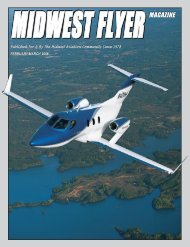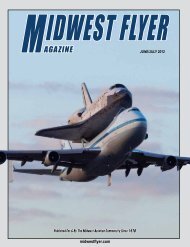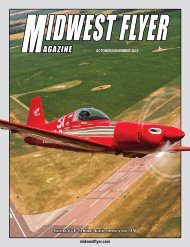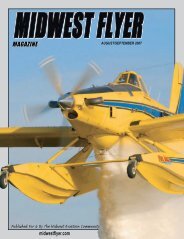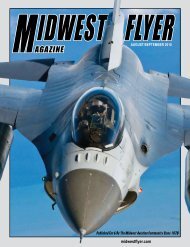minnesota - Midwest Flyer
minnesota - Midwest Flyer
minnesota - Midwest Flyer
Create successful ePaper yourself
Turn your PDF publications into a flip-book with our unique Google optimized e-Paper software.
ing activities, especially during the<br />
winter.<br />
Ron recently bought a new<br />
Tecnam Bravo S-LSA and has been<br />
flying it extensively, including on<br />
cross-country trips from his home in<br />
Southwest Wisconsin to the Lake<br />
Superior region of northern<br />
Wisconsin, and into the Chicago<br />
metro area.<br />
Ron Anderson is happy with his<br />
Sport Pilot Certificate and his new S-<br />
LSA, although he did find that insurance<br />
was a bit of a challenge to<br />
obtain, and only at a fairly stiff premium.<br />
Michael Lord is a Sport Pilot student<br />
at Plane Guys Aviation in<br />
Waupaca, Wisconsin. He is a dental<br />
technician by training, but sold his<br />
clinic years ago, and took up a second<br />
career in auto racing. Recently retired<br />
from that activity, Mike is building a<br />
Zenith 601XL and pursuing his Sport<br />
Pilot Certificate. Although he is now<br />
only engaged in flight training, Mike<br />
has been around aviation for years,<br />
including experience as a paratrooper,<br />
skydiver and frequent AirVenture<br />
attendee with his pilot buddies.<br />
The lack of available flight training<br />
close to home was an issue for<br />
Mike as well. Although he lives in the<br />
Green Bay metro area, which is home<br />
to about 200,000 people, the two closest<br />
flight training operations offering<br />
Light Sport Aircraft<br />
MAINTENANCE<br />
the Sport Pilot program were 100 and<br />
65 miles respectively from his home.<br />
He chose the closer, Waupaca, and<br />
has been very happy with his choice.<br />
He also spent two weeks at a flight<br />
school in St. Charles, Missouri, where<br />
poor weather and limited aircraft<br />
availability hampered progress.<br />
Mike is pursuing SP-LSA aviation<br />
as a hobby; something to do, he says,<br />
as he admits to workaholic tendencies.<br />
He hopes to progress and<br />
become better and better, and is<br />
impressed with how aviation offers so<br />
much to learn.<br />
The Sport Pilot Certificate and<br />
Light Sport Aircraft suit Mike’s purposes.<br />
He also winters in Florida, and<br />
looks forward to turning a boring<br />
drive into a flying “adventure.” He<br />
feels that LSAs are affordable compared<br />
to other new aircraft and are<br />
fast/capable cross-country airplanes.<br />
Both of these SP-LSA enthusiasts<br />
represent a segment of the market<br />
identified by Peter Andersen. Both<br />
struggled to find available training,<br />
and both were willing to travel considerable<br />
distances to obtain it. Both<br />
are willing and able to spend time and<br />
money to own new Light Sport<br />
Aircraft. However, neither of these<br />
flyers represent other, larger market<br />
segments often identified as the<br />
biggest potential for the success of the<br />
Sport Pilot-Light Sport Aircraft movement:<br />
younger people, converting<br />
ultralight pilots, and the motor sports<br />
crowd.<br />
While signs are clear that SP-LSA<br />
fits the needs of folks like Mike and<br />
Ron, given the profile of early LSA<br />
buyers, the jury is still out on the<br />
breadth of the appeal of this new<br />
branch of general aviation to these<br />
other groups.<br />
The barriers here are often said to<br />
be high entry costs, both in terms of<br />
time and money, as compared to other<br />
recreational pursuits, including other<br />
motor sports. Mike Lord believes that<br />
a portion of the motor sports crowd<br />
will be attracted to S-LSA, but does<br />
not think the word is effectively getting<br />
out to the non-aviation public.<br />
What do you think? What have<br />
you been seeing? What are your plans<br />
for SP-LSA in your own life? What<br />
are the positives and negatives from<br />
your perspective? Can you help us<br />
separate the facts from the myths?<br />
We’d like to hear from you, whether<br />
you are an FBO, CFI, existing pilot,<br />
or prospective SP student. We would<br />
like to hear from folks outside of<br />
Wisconsin as well as within. Please<br />
contact me.<br />
Future articles will follow the<br />
development of the SP-LSA movement,<br />
and explore the impact these<br />
initiatives are having in the <strong>Midwest</strong><br />
by interviewing various people<br />
involved in trying to make it a success,<br />
including flight instructors,<br />
pilots, insurance agents and those<br />
starting LSA sales enterprises.<br />
Readers’ views on these issues are<br />
sought and welcome.<br />
Editor’s Note: Ed Leineweber is a<br />
part-time CFI with a particular interest<br />
in SP-LSA issues. His flight training<br />
focus is tailwheel transition training<br />
and the Sport Pilot Certificate.<br />
Leineweber has over 25 years experience<br />
in aviation and related businesses.<br />
He was an FBO in the past and is<br />
now a co-owner of an LSA dealership.<br />
He is a circuit court judge in his “day<br />
job.” Readers are encouraged to email<br />
Ed at edleine@countryspeed.com or<br />
call (608) 604-6515.<br />
❑<br />
by Joe Rethmeier<br />
Minnesota’s First LSA Certified<br />
Repairman-Maintenance Technician<br />
• Special* & Experimental LSA<br />
• LSA Weight Shift Control (Trike)<br />
• LSA Powered Parachute<br />
952-544-0440 • jogofly0440@msn.com<br />
Minneapolis, Minnesota<br />
Joe Rethmeier has completed the 120-hour Light Sport Repairman-Maintenance<br />
Course, and the 19-hour courses for LSA Weight Shift Control (trikes) and LSA<br />
Powered Parachutes through Rainbow Aviation Services of Corning, Calif. Mr.<br />
Rethmeier is now one of the first licensed Light Sport Aircraft technicians in the<br />
United States, and the first in Minnesota.<br />
* Special LSA are delivered turnkey flyable from a manufacturer, and meet certain ASTM “consensus standards.”<br />
56 MIDWEST FLYER MAGAZINE OCTOBER/NOVEMBER 2007<br />
Powerplant Developments Unveils<br />
Three-Cylinder, Liquid Cooled, Diesel<br />
Piston Engine For LSA Market<br />
WEST SUSSEX, ENGLAND –<br />
Powerplant Developments, Limited<br />
(PPD) announced during EAA<br />
AirVenture-Oshkosh, July 24, that it is<br />
well into the development and certification<br />
process for the new two-stroke,<br />
three-cylinder diesel “Gemini 100<br />
Engine.” The new lightweight, highperformance<br />
100 horsepower diesel<br />
engine will initially be offered to the<br />
Light Sport Aircraft (LSA) market.<br />
The Gemini Engine introduces a<br />
number of uncommon, yet proven,<br />
CONTINUED ON PAGE 62



